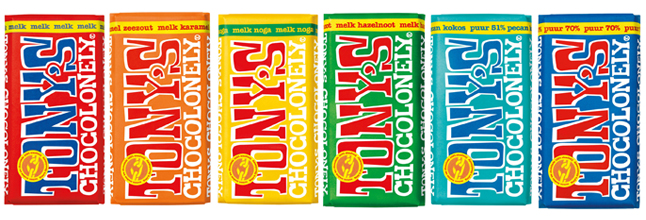
Last fall, the Daily Beast published an article about the lawsuit recently filed against Nestle, Mars, and Hershey, which alleges that these companies are guilty of false advertising for not disclosing their chocolate was likely made using slave labor. The story quotes Shady Chocolate director Miki Mistrati, who said:
[T]he lawsuit may help, but it won’t be the answer. There is no doubt that a campaign about the reality in chocolate production will harm the chocolate companies. Modern slavery with children is a part of the chocolate industry today. But I do not think that it can be the real game changer.
In the absence of effective legal measures to end child slavery, Tony’s Chocolonely is making a serious bid to become that game changer. Based in the Netherlands, the company has been working for ten years to make the chocolate industry 100% slave-free. And just recently, Tony’s launched an ambitious international expansion effort.
Peter Zandee, the company’s U.S. sales manager, is leading the charge—starting here, in Portland. We decided talk to welcome Peter to the neighborhood, and our chat quickly evolved into a long-form interview, which we thought we could share with the readers of our blog.
If you missed the first half of our conversation, click here to read Part 1.
This interview has been edited and condensed for clarity.
MORGAN RIDER: We talked previously about fair trade. Aside from that, there are millions of labels, from gluten-free to GMO, natural, organic… What’s your sense of what these mean to consumers, and how seriously do you take labeling as a company?
PETER ZANDEE: We call that “label bingo.” People understand less and less of what these labels mean. To us, fair trade is the most important certification, but we feel that every company should take their own responsibility to work on what’s happening in their supply chain and not hide behind labels.
We’re all about impact. Over the last couple of years there have been lots of initiatives but there’s not necessarily a lot of impact. And the situation is getting worse. The larger cocoa companies have set up initiatives, but if the situation is getting worse, then something is broken. You can be proud of the fact that you’re “doing something,” but if there’s no outcome at the end of the day, then what’s the use?
At GB, we see our role as trying to help catalyze a greater movement in the market among consumers to care more about the companies they buy from. In your mind, what does it take for a standard like B Corp, organic, or slave-free to catch fire in the hearts of consumers?
I am not confident that a standard or label really can. With so many labels and certifications it has become too confusing. Maybe more so than labels consumers are looking for companies that they trust. Patagonia is a great example.
What about the slave-free label speaks to people?
We are not proposing another label. We show that it can be done differently, by creating a transparent system and working directly with the farmers. This is the right thing to do for everybody. It’s certainly the right thing to do, as far as I’m concerned, from an ethical perspective.
Let’s talk about transparency and consumer education. How do you think consumer attitudes have shifted in terms of where products come from, and how those products are made? What tactics have you used to successfully educate and motivate consumers to make better choices?
We don’t do any paid advertising. We have our chocolate bars—when they’re on store shelves, they look so different from anything else. People pick them up, and they love the packaging. There’s information on the bar, and when you open the bar they just look completely different from any other chocolate bar because they’re unequally divided. We’ve done that to sort of showcase that things are not shared fairly in the chocolate industry.
We do lots of talks and demonstrations. Right now, in Portland, we’re in the store a lot. We do what we call “Tony Talks,” where we go to companies or organizations or schools and basically talk about what we’re trying to do. In that way, we create more awareness.
And in Holland, we have a pretty large social media following, but it all basically happened organically. People get excited about it. It’s just amazing to see the response that you get.
Bob’s Red Mill is a client of ours, and Bob’s has been in Portland for forty or more years now too. They had nationwide and global distribution, but nobody outside the northwest knew Bob, or why you should grab his flour versus King Arthur versus General Mills. That was one of the things we have to do with our marketing: tell the story about Bob—what he does, he loves, and the company. What are some of the issues you face in simply getting the brand out there and selling chocolate?
We’re growing much faster than anybody else, and that puts commercial pressure on us. Sometimes it complicates our ability to sell the chocolates. But because of our mission, story, and our brand, it’s still easy to stop people in their tracks and get them to listen to you.
In Holland, there’s clearly this duality in our brand between the seriousness of the issue and what we are trying to accomplish, and then the “fun factor.” We always have to be careful not to go too far in one direction or the other. If we get overly serious, then it becomes too depressing. If we get too fun, then we end up losing the the fact that we are here to really change the industry.
What do your expansion plans in the U.S. look like now?
We’re looking at the Seattle market. Maybe we’ll go to San Francisco and Denver—maybe a couple of months from now. We want to try to keep it somewhat controlled, although it’s really difficult because it’s the genie’s out of the bottle, and we’ve gotten calls from everywhere. People now want to sell our chocolates.
A lot of small natural and organic foods companies start out with a great product and a great mission. They get large enough and gain enough traction to make the larger companies acquire them. So often these large companies don’t have the trust, mission and brand core, so it can come across to consumers like the big guys are trying to “buy” the authenticity by acquiring smaller brands.
Yes. There’s no interest in selling Tony’s at the moment. There’s still so much opportunity to further our cause. But in the future, who knows? If, all of a sudden, it could really propel our cause, then that might be a possibility. For us, the goal is a 100% slave-free chocolate industry. Right now, though, this is not something we’re thinking of.
What we want to do is make great chocolates. Like we say, we’re crazy about chocolate and serious about people. We want to make amazing-tasting chocolate for an affordable price without using illegal child labor. That’s what we’re out to prove: a great chocolate, at a very affordable price, produced without the use of child labor.
